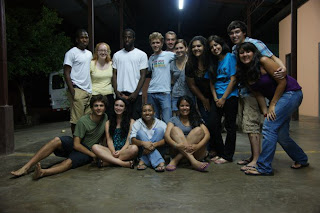
What can I say about a trip that has so vastly affected my life in so many ways? When first presented with the idea to go on this trip, I instantly wanted to be apart this life changing experience. It was time to leave the simplicity and mundane routine of my life in New Jersey for a more meaningful experience. The idea of going to a third world country, a life that was so outside and foreign to mine, not only excited me but at the same time terrified me. Regardless, I was determined on going and opening my eyes and heart to the loving people and vivid culture of the beautiful country of Nicaragua.
When we first arrived to Nicaragua, we were immediately met with smiles, and for the remainder of the trip we were shown a kindness and a hospitality that transcends any we were accustomed to in the States. It was as if the people of Nicaragua, a people who have very little, were willing to give whatever they did have in order to make us happy and comfortable. The best example of this was seen all throughout our stay in the campo. Our campo families, who we all developed close and loving relationships with, taught us that even though you may not have worldly possessions or materials, there are much more important things in life like community, laugher, soccer games, thunderstorms, family, friends, and most importantly love. All of the people we met throughout this trip taught me so much about the human will to survive, endure, and persevere. My most vivid memories of this spirit were shown through the Nemagon workers and the hundreds families that lived and worked out of this enormous garbage dump. There was this sense of community that I have never experienced in America. We heard testimonies of their overwhelming desire to provide for their families, but to also provide and protect those families in their community.
Ironically, I went to Nicaragua with the idea that our group would somehow have something to teach the people, but it was us who learned so much from them. I not only learned much about the country and how the relationship shared between Nicaragua and the United States greatly affects every policy of this rich land, but I also learned a lot about myself and what it truly means to be a servant leader. Every experience we shared with the people was filled with emotion and this overpowering urge to help. I want everyone to know the struggles and heartache of these people and to know that we as a county need to become educated on the unjust American policies that continue to hinder and stunt the growth of Nicaragua. The people of Nicaragua have spoken, and for decades their cries have fallen on deaf ears. It’s time for change, and that time is now. Through my experiences I now feel that it is my civic duty to not only bring awareness to my personal communities about the injustices and adversities that plague the Nicaraguan people, but to allow this awareness to encompass a larger scale of people, perhaps state or even nation wide. If we do not try to campaign for the people of Nicaragua, then who will? Certainly not the representatives of the US Embassy we visited, nor the corrupt Nicaraguan government officials, and unfortunately not even their very own president.
I will never forget the people and culture of Nicaragua. This is experience was beyond life changing and I hope that in the future I am able to participate in trips just like this one. It’s hard to believe that it only took 10 days for me to fall in love. In only 10 days I realized that something had to be done to try to help our family in Nicaragua, and I truly hope and believe that through all of our delegation training we will be able to develop some type of concrete plan to help alleviate and bring awareness and later change to many of the pressing problems in Nicaragua. It was not enough to simply sit idly in classroom learning about the country, its people, and their problems. We had to truly submerse ourselves in that culture and get down in the dirt and dig, plant, protect, cry, sing, dance, laugh, and nurture right along side of our brothers and sisters of Nicaragua.
Bonner love,
Ashley